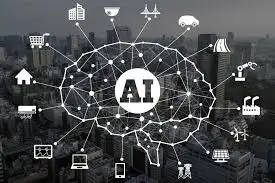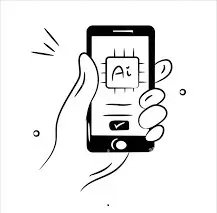Private AI: The Future of Secure and Responsible Artificial Intelligence
Published on: July - 2025
What is Private AI and Why Does It Matter?
Private AI refers to the deployment of
artificial intelligence models and systems that prioritize user privacy, secure data handling, and decentralized processing. It empowers businesses to innovate with AI while staying fully compliant with privacy regulations like GDPR, HIPAA, and CCPA. In contrast to traditional AI systems, which often rely on centralized data processing, Private AI enables computations directly on local devices or encrypted servers.
This shift is vital in a world where data privacy is not just a regulatory requirement but a business imperative. From personalized healthcare to intelligent banking and customer-centric retail, organizations are seeking ways to build AI solutions that don’t compromise on data security. The foundation of Private AI lies in the ethical application of machine learning, giving users control over their data while enabling smarter, more contextualized AI models.
“Private AI empowers businesses to unlock AI-driven value while keeping sensitive data private, secure, and fully compliant with global regulations. It combines innovation with integrity, making it essential for future-ready enterprises.”
How Private AI Works: Core Technologies Powering Privacy-First AI
Private AI isn't a single tool, it's a collection of advanced technologies and practices designed to keep data decentralized, secure, and invisible during AI model training and deployment. These systems protect user identity, secure transactions, and ensure AI works in real-time environments without compromising on speed or accuracy.
These technologies are increasingly integrated across sectors that require low-latency decision-making, such as finance, healthcare, and national defense. They enable secure AI infrastructure without exposing raw data to external servers. Below are the key pillars that make Private AI possible.
Federated Learning in Private AI
Federated learning is a core mechanism in Private AI that allows model training across multiple endpoints or devices without transferring data to a centralized location. This method ensures sensitive data stays within local environments, be it a smartphone, wearable device, or enterprise-grade system.
It is especially impactful in healthcare, where hospitals across regions can collaborate on disease detection models without ever sharing patient data. Federated learning also ensures scalability the model improves with more participation, while privacy remains intact. This approach not only respects user privacy but also enhances security by minimizing the exposure of sensitive datasets.
On-Device AI: Intelligence at the Edge
On-device AI processes data locally, on phones, smartwatches, sensors, or
autonomous vehicles, allowing real-time decisions without sending data to cloud servers. This drastically reduces the risk of data leaks, latency issues, and bandwidth consumption.
For example, virtual assistants like Siri or Google Assistant increasingly rely on on-device learning for personalization. This form of edge AI ensures users get personalized experiences without ever transmitting raw voice or usage data to the cloud. It also aligns well with sustainability goals, reducing reliance on large-scale data centers.
Differential Privacy and Synthetic Data
Differential privacy introduces mathematical noise to datasets to mask individual identities while allowing aggregate trends to remain useful for model training. This means even if someone accesses the data, they cannot reverse-engineer the identity of users.
Synthetic data takes this further, creating artificial datasets with the same statistical properties as real data but without including any actual user information. This is ideal for industries like pharmaceuticals and banking, where sensitive data is frequently used to train predictive algorithms.
Confidential Computing and Secure Enclaves
Confidential computing uses hardware-based secure environments, known as enclaves, to encrypt data during processing. Even system administrators or malicious insiders can’t access data running in these environments.
This technique is becoming essential in cloud computing scenarios where companies want to run AI models without trusting third-party servers. It’s now being adopted in defense, finance, and legal sectors where ultra-sensitive computations must be executed without visibility to infrastructure providers.
Key Benefits of Private AI for Enterprises
Private AI not only solves data privacy challenges, but it also gives businesses a unique edge in a hyper-competitive, regulation-heavy world. Whether you're a startup or a global enterprise, embracing privacy-preserving AI unlocks long-term scalability, customer trust, and brand resilience.

Enhanced Trust and Reputation
Today’s consumers demand transparency about how their data is used. Organizations that adopt Private AI can demonstrate accountability by showing they operate without storing or misusing personal data.
This leads to higher user engagement, customer loyalty, and long-term retention. In a privacy-conscious digital economy, trust is currency, and Private AI enables businesses to earn it. Brands that lead with privacy also tend to face fewer PR and legal challenges related to data breaches.
Compliance with Global Privacy Laws
Private AI aligns naturally with global privacy regulations such as GDPR in Europe, CCPA in California, and upcoming frameworks like the EU AI Act. These laws require businesses to justify how data is collected, used, and processed.
Using privacy-first AI infrastructure protects organizations from fines and reputational damage. It also prepares them for future changes in data governance, giving them a competitive compliance advantage. As regulators grow more sophisticated, Private AI ensures you're always ahead of the curve.
Competitive Edge through Responsible Innovation
Businesses that implement responsible AI practices early on will gain long-term competitive advantages. Customers are more likely to engage with products they trust, and regulators favor companies that take proactive steps toward ethical technology.
Private AI enables fast product development, smarter personalization, and deeper insights, all without violating user privacy. This form of responsible innovation also attracts better partnerships and investor confidence.
Industry Applications of Private AI
Private AI isn’t limited to one niche, it’s reshaping multiple sectors where data privacy and security are mission-critical. The demand for real-time, secure, and personalized insights is growing, and Private AI is answering that call across verticals.

Healthcare and Life Sciences
In medical diagnostics and clinical research, Private AI ensures that patient data is never exposed while still being used to train and deploy AI models. Hospitals can collaborate without risking data leaks.
AI-driven imaging tools,
digital health assistants, and early disease detection algorithms benefit from federated learning, enabling life-saving outcomes with privacy baked in. This also builds greater trust between healthcare providers and patients.
Banking, Financial Services & Insurance (BFSI)
Private AI allows financial institutions to detect fraud, analyze creditworthiness, and provide personalized services, all while keeping transaction and identity data protected. Differential privacy and encrypted data models ensure no regulatory lines are crossed.
Banks can also collaborate on AI models to detect financial crimes across borders without sharing actual customer data. This sets a new benchmark for global financial security and transparency.
Government and Defense
For agencies handling national security, citizen services, and classified communications, Private AI allows automation without sacrificing data integrity. Secure enclaves and encrypted AI pipelines are ideal for these high-stakes environments.
From military logistics to secure ID verification systems, government bodies can use AI in highly sensitive contexts without risking data exposure. This also supports sovereign digital infrastructure initiatives.
Retail & eCommerce
Private AI helps retailers personalize shopping experiences, optimize inventory, and analyze buying behavior, while ensuring that customer data like browsing history or purchase patterns remain secure.
With growing concern around surveillance and data misuse, privacy-preserving recommendations build consumer confidence and drive conversion. Retailers also avoid dependencies on third-party trackers or invasive advertising platforms.
Private AI vs Traditional AI: What’s the Difference?
| Feature |
Traditional AI |
Private AI |
| Data Processing |
Centralized |
Decentralized |
| Privacy Compliance |
Limited |
High |
| Use Cases |
Generalized |
Sensitive & Regulated |
| User Control |
Minimal |
High |
| Trust Level |
Low |
High |
| Security Risk |
Higher |
Significantly Lower |
This comparison highlights how Private AI redefines trust, control, and compliance, offering a future-ready alternative to legacy AI systems.
Is Your Business Ready for Private AI?
Private AI is not just another buzzword; it's the backbone of next-generation AI adoption that prioritizes ethics, transparency, and responsibility. Organizations that lead with Private AI will set the gold standard in trust and compliance, ensuring long-term resilience in a fast-evolving digital ecosystem.
From improving operational efficiency to transforming customer relationships, the impact of privacy-centric AI is both immediate and long-lasting. The choice is clear: embrace Private AI now, or risk being left behind in a world demanding safer, smarter innovation.
← Back to News & Media